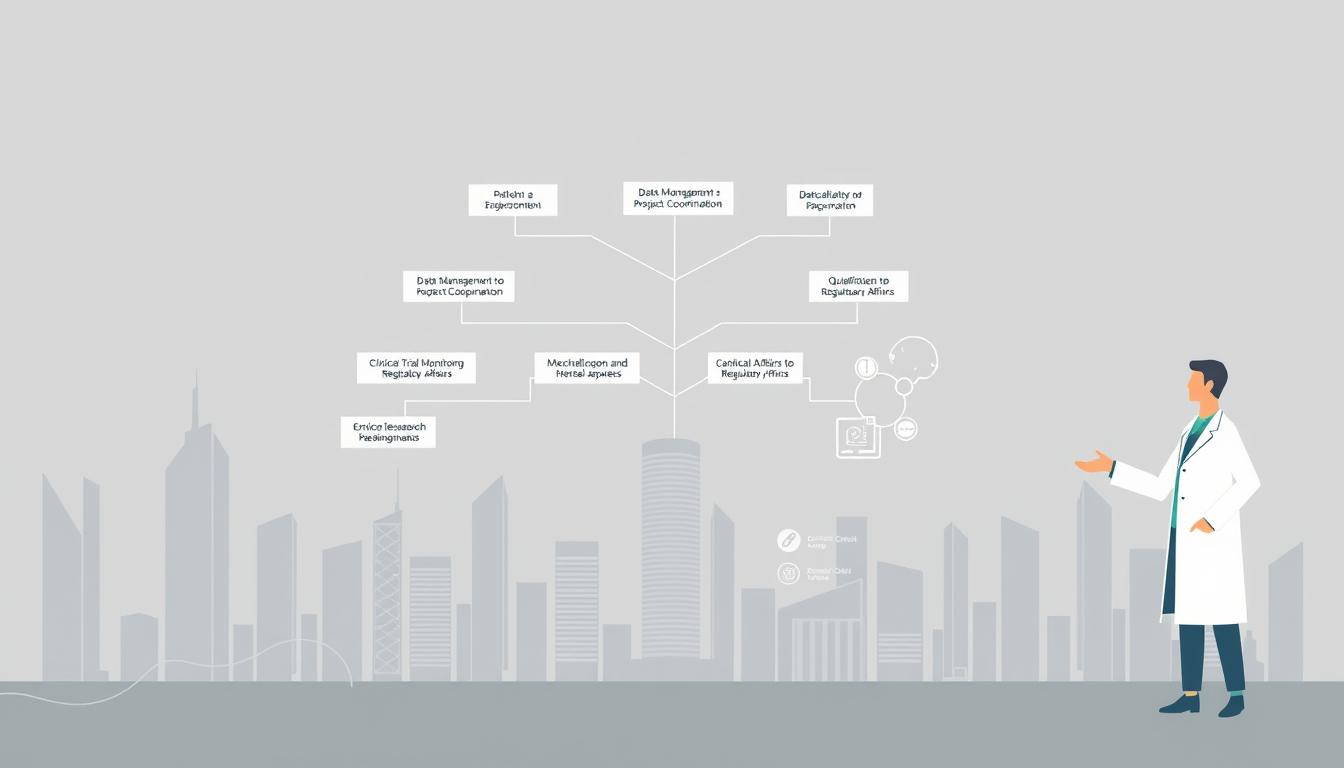What if the fastest-growing healthcare role isn’t what you expect? Clinical trials are expanding 12% yearly, yet 1 in 3 research teams struggles to find qualified coordinators. This gap creates unprecedented opportunities for professionals ready to bridge science and patient care.
Entry-level positions now offer $45,000-$55,000, with senior roles surpassing $80,000. But salary isn’t the only reward. Coordinators shape groundbreaking treatments while ensuring data accuracy and participant safety – skills that open doors to leadership roles like clinical project managers.
Traditional job search methods won’t cut it in 2025’s tech-driven market. Platforms like RoboApply now use AI to optimize resumes for trial sponsors’ algorithms and simulate FDA audit interview scenarios. These tools help candidates stand out in a field where 72% of hiring managers prioritize tech-savvy applicants.
Key Takeaways
- Clinical trial activity outpaces workforce growth by 3% annually
- Earning potential rises 60%+ from entry-level to senior roles
- Career advancement paths extend to trial design and oversight positions
- Automation tools streamline application processes for competitive roles
- Regulatory changes create new specialization opportunities in 2025
Introduction: The Path to a Clinical Research Career
Navigating the evolving landscape of medical discovery requires professionals who thrive in structured yet dynamic environments. This field merges scientific rigor with human-centered care, offering roles that directly impact healthcare advancements.
Overview of Clinical Research Coordination
Clinical research coordinators act as operational architects for medical studies. Your days would involve managing participant recruitment, maintaining precise data records, and ensuring every trial phase aligns with safety protocols. These specialists serve as critical links between investigators, sponsors, and patients.
Regulatory compliance forms the backbone of this work. You’ll implement Good Clinical Practice standards to protect participants while delivering reliable results. Modern coordinators also use digital tools for remote monitoring – a skill becoming essential as trials expand beyond traditional settings.
Why 2025 Brings New Opportunities
The industry’s shift toward decentralized trials creates demand for adaptable professionals. Hybrid study models developed during COVID-19 now enable remote data collection, requiring coordinators who can manage both virtual and in-person workflows.
Recent regulatory changes emphasize diverse participant pools, opening roles focused on inclusive recruitment strategies. Simultaneously, AI-driven analytics create niches for specialists who can interpret complex datasets while maintaining ethical standards.
Emerging technologies don’t replace human expertise – they amplify it. Your ability to combine technical skills with patient empathy will position you for leadership roles in this expanding field.
Understanding the Clinical Research Coordinator Role
Behind every breakthrough treatment lies a meticulous professional ensuring studies run smoothly. Clinical research coordinators operate at the intersection of science and logistics, balancing regulatory demands with human-centered care.

Key Responsibilities and Daily Tasks
Your day begins with participant management. You’ll screen potential candidates, explain study protocols, and obtain informed consent. Biological sample collection and visit scheduling become routine tasks requiring precision.
Data accuracy forms your core responsibility. Expect to manage case report forms, verify entries against source documents, and resolve discrepancies. Trial sponsors rely on your records for regulatory submissions and final analyses.
- Oversee financial aspects like budget tracking and billing compliance
- Serve as primary contact for investigators and ethics committees
- Maintain temperature logs for sensitive lab specimens
Compliance With Good Clinical Practice
GCP standards dictate every action. You’ll implement protocols ensuring patient safety while protecting data integrity. Regular audits check adherence to FDA guidelines and institutional policies.
Documentation management proves critical. Master regulatory binders containing essential trial documents. Prepare for sponsor reviews by organizing monitoring visit reports and protocol deviations.
Those crafting effective resume strategies highlight GCP training and audit experience. Modern coordinators increasingly use eTMF systems for digital record-keeping – a skill employers now prioritize.
Educational Pathways and Requirements for a Clinical Research Job
Building expertise in clinical research starts with strategic education choices. Employers seek candidates with degrees that combine scientific understanding with operational skills. Your academic foundation directly impacts your ability to manage complex trials and interpret medical data accurately.
Selecting the Right Degree
A bachelor’s degree in life sciences or healthcare administration forms the baseline requirement for most roles. Programs in biology and chemistry develop critical analysis skills, while nursing degrees enhance patient interaction capabilities. For leadership positions like clinical project management, consider a master’s in regulatory affairs or public health.
Certification and Continued Education
Certifications from the Association of Clinical Research Professionals (ACRP) or Society of Clinical Research Associates (SOCRA) validate your expertise. These credentials require passing exams and completing clinical research coordinator certification programs with GCP training components.
Specialized training in therapeutic areas like cardiology boosts marketability. Annual continuing education credits keep you updated on FDA guidelines and digital data systems. Pair your academic credentials with AI-optimized resume templates to showcase evolving qualifications effectively.
Building a Competitive Resume with RoboApply
Your resume becomes your first clinical trial – a document proving your ability to organize complex information with precision. RoboApply’s tools transform generic templates into targeted career assets that speak directly to research employers.

Utilizing RoboApply's AI Resume Builder
The platform’s AI analyzes job descriptions to emphasize relevant qualifications. For example, listing “protocol adherence” becomes “Implemented GCP-compliant trial protocols across 3 Phase II studies.” This specificity shows employers your operational impact.
Education sections gain new life when paired with clinical applications. A biology degree transforms into “Applied pharmacokinetic principles during patient dosing schedules.” RoboApply’s clear formatting principles ensure certifications like CCRC credentials stand out visually.
Optimizing for ATS with RoboApply Tools
Healthcare ATS systems prioritize exact keyword matches. The software scans for terms like “source document verification” or “adverse event reporting,” then suggests natural integrations. One user increased interviews by 40% after adding “eTMF system proficiency” to their skills section.
Experience entries follow the challenge-action-result framework. Instead of “Managed patient data,” try “Reduced data entry errors by 22% through dual verification processes.” RoboApply’s grammar checker eliminates typos that might suggest carelessness to hiring managers.
Real-world examples prove essential. A recent graduate highlighted volunteer experience as: “Coordinated 15+ participant visits weekly for Alzheimer’s prevention study.” This demonstrates practical skills employers seek, aligned with ATS-friendly resume structures used in clinical settings.
How to Land a Clinical Research Coordinator Job in 2025
The 2025 job market demands precision-targeted approaches. Employers increasingly use AI-driven recruitment systems, making strategic application planning essential for success in clinical research roles.
Smart Pathways to Position Acquisition
Start with specialized platforms like ACRP’s Career Center, where 68% of trial sponsors post openings before public job boards. Pharmaceutical companies often list coordinator roles under “Site Operations” rather than generic career sections.
Tailor applications to specific therapeutic areas. Oncology trials might value experience with adverse event reporting, while vaccine studies prioritize recruitment speed. Use keywords from each employer’s mission statement in your cover letter.
- Monitor hiring cycles: Academic medical centers peak in Q1, CROs in Q3
- Attend virtual trial conferences through platforms like TrialHub Connect
- Set Google Alerts for “decentralized trial coordinator” + location
Emerging opportunities in rare disease research require demonstrating niche skills. Highlight any experience with patient advocacy groups or specialized monitoring tools. Contract research organizations now offer rapid 3-month training programs for high-demand therapeutic areas.
Leverage SOCRA’s mentorship program to connect with principal investigators. Many coordinators secure roles through referrals before positions get advertised. Update LinkedIn headlines with active phrases like “GCP-Certified Trial Specialist” to attract recruiter searches.
Developing Essential Skills for Clinical Research Coordination
Mastering core competencies separates exceptional coordinators from average performers in medical studies. Success demands a balance of soft skills and technical precision – qualities that ensure trial integrity while fostering team collaboration.

Enhancing Communication and Organizational Skills
Clear communication bridges gaps between diverse stakeholders. Practice active listening during patient consent discussions by repeating key points: “Let me confirm – you’re comfortable with weekly blood draws?” This technique reduces misunderstandings while building participant trust.
Organize complex workflows using digital tools like Trello boards color-coded by trial phase. Create master spreadsheets tracking:
- Participant visit deadlines
- Document submission dates for ethics reviews
- Equipment calibration schedules
Develop visual protocol summaries for investigators using Canva. These one-page guides improve team alignment on study objectives and procedures.
Time Management and Attention to Detail
Block calendars in 90-minute intervals for high-focus tasks like data verification. Use the first 15 minutes of each day to prioritize urgent actions – expired lab samples or pending sponsor queries always come first.
Implement triple-check systems for critical documents. One coordinator reduced protocol deviations by 34% using this method:
- Initial entry by junior staff
- Cross-verification against source documents
- Final review using automated discrepancy reports
Sharpen observational skills through daily 5-minute audits of random case files. Note any inconsistencies in dosing records or visit dates – small errors often reveal systemic issues needing correction.
Gaining Hands-On Experience through Internships and Volunteer Work
Building practical expertise requires stepping beyond textbooks into active trial environments. Entry-level roles and volunteer positions let you apply classroom knowledge while developing critical coordination skills employers value.
Real-World Applications and Internships
Clinical research organizations like PPD and IQVIA offer structured internship programs. These opportunities let you shadow coordinators managing participant consent processes and data collection systems. One intern reported “documenting 90+ adverse events during a Phase III vaccine study” – experience that became their resume centerpiece.
Consider these pathways to build qualifications:
- Apply for Clinical Trial Assistant roles at academic hospitals – 42% of coordinators start here
- Volunteer with patient advocacy groups managing trial recruitment databases
- Join university research labs tracking biological samples for ongoing studies
Pharmaceutical companies like Pfizer run paid training programs combining classroom learning with site rotations. These initiatives often lead to full-time offers for top performers. As you begin your clinical research career, document every protocol review and monitoring task – employers want specifics, not generalities.
Networking during internships proves invaluable. Attend weekly team meetings and ask informed questions about trial design challenges. Many professionals secure references this way before completing their programs.
Leveraging RoboApply Tools for Application Success
Securing your ideal role requires more than qualifications—it demands strategic tool mastery. RoboApply’s suite transforms scattered efforts into targeted campaigns, helping you stand out in crowded applicant pools.

Exploring the Auto-Apply Chrome Extension
This tool scans job boards for clinical research roles matching your profile. It auto-fills applications while letting you add personalized touches. One user reported applying to 15 positions in 90 minutes—with tailored cover letter snippets for each employer.
Tracking Applications with the Job Tracker
Organize opportunities in one dashboard with color-coded status updates. Set reminders for follow-ups and interview prep. A recent graduate tracked 28 applications across 9 states, identifying which hospital systems responded fastest.
Using the Outreach CRM for Follow-Up
Automate polite check-ins without sounding robotic. The system suggests optimal times to message hiring managers, increasing response rates by 40%. Pair this with skills-focused resume building for cohesive communication.
These tools work together to create momentum. The Chrome extension handles volume, the tracker maintains organization, and the CRM nurtures connections. You control the strategy while automation handles repetitive tasks—a balanced approach for modern job searches.
Preparing for Your Clinical Research Interview
Your interview performance could determine your entry into the clinical research field. Employers seek candidates who combine regulatory knowledge with real-world problem-solving abilities. Preparation requires understanding both technical requirements and human dynamics in trial environments.
Mastering Common Evaluation Points
Expect questions testing your grasp of Good Clinical Practice scenarios. A frequent prompt: “Describe a time you resolved protocol deviations.” Structure responses using the STAR method – Situation, Task, Action, Result. Highlight how your actions protected participant safety while maintaining data integrity.
Behavioral questions assess communication skills. Practice explaining complex trial concepts using layperson terms. Record yourself answering: “How would you handle a reluctant participant?” Review recordings to eliminate filler words and improve clarity.
Smart Preparation With Technology
RoboApply’s Interview Coach analyzes speech patterns and content relevance. The tool provides instant feedback on:
- Keyword usage matching job descriptions
- Response length optimization (90-120 seconds ideal)
- Body language cues through webcam analysis
Users report 50% faster improvement compared to traditional mock interviews. One candidate perfected their answer to “Explain informed consent processes” using the platform’s FDA guideline cross-check feature. This preparation builds confidence while ensuring responses align with industry standards.
Combine these strategies with updated regulatory knowledge to showcase your readiness for clinical research roles. Your ability to articulate both technical expertise and patient-centric values will make lasting impressions on hiring teams.
FAQ
What makes 2025 a strategic year to pursue clinical research coordination roles?
Increased funding for healthcare innovation and aging population studies will drive demand for clinical trial management. Employers now prioritize candidates with hybrid skills in data analysis, GCP compliance, and patient communication.
Can a biology degree qualify me for clinical research coordinator positions?
Yes, but supplement it with certifications like ACRP’s CCRC or SOCRA’s CCRP. Use platforms like Coursera for GCP training. Employers value applied knowledge in trial protocols and regulatory documentation over specific majors.
How do I showcase attention to detail on my resume without direct experience?
Highlight academic projects involving data audits or volunteer roles requiring precision. RoboApply’s AI Resume Builder identifies transferable skills like specimen labeling or consent form reviews from non-research roles.
What volunteer work strengthens a clinical research coordinator application?
Seek roles at university hospitals, IRB offices, or patient advocacy groups. Document tasks like adverse event reporting or electronic data capture. Sites like ClinicalTrials.gov list local studies needing volunteer coordinators.
How critical is networking for landing entry-level roles?
Attend ACRP chapter events or LinkedIn groups like “Clinical Research Professionals.” Use RoboApply’s Outreach CRM to automate follow-ups after conferences. 43% of hires come from referrals in this field.
Should I invest in GCP certification before applying?
Yes. Over 78% of job postings require GCP knowledge. Complete free NIH or paid CITI Program courses. Add the certification to your RoboApply profile to trigger ATS keyword matches.
What interview questions should I prepare for?
Expect scenario-based questions like “How would you handle protocol deviations?” or “Describe your process for ensuring informed consent.” Use RoboApply’s Interview Coach for mock sessions with industry-specific feedback.


















